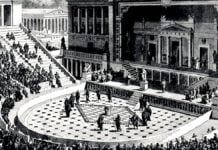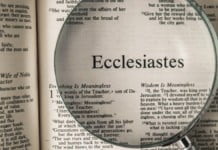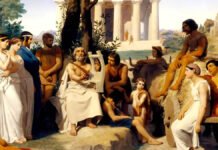Theme for English B is a powerful and introspective poem by Langston Hughes, first published in 1951 as part of his collection Montage of a Dream Deferred. The poem explores race, identity, self-exploration, and the complex relationship between individuals and society. Written during the Harlem Renaissance, the poem reflects Hughes’s deep engagement with African American consciousness and the struggle for racial equality.
Through a conversational and confessional tone, Hughes presents a young Black student’s response to a writing assignment given by his instructor. As the speaker reflects on his personal experiences, the poem raises questions about who defines truth, how racial identity shapes one’s perspective, and the interconnectedness of Black and white lives in America.
Summary
The poem is structured as a dramatic monologue in which the speaker, a young Black student, contemplates his identity while responding to an English class assignment. The poem begins with a straightforward instruction from the instructor:
“Go home and write a page tonight.
And let that page come out of you—
Then, it will be true.”
The speaker immediately questions the simplicity of this task, acknowledging the subjectivity of truth and the complexity of his own identity. He describes his background, stating that he is the only Black student in his English class at Columbia University, a predominantly white institution. He then reflects on his journey from the Southern city of Winston-Salem, North Carolina, to Harlem, New York, highlighting his geographical and racial experiences as formative influences.
As the speaker describes his daily life, interests, and personal experiences, he points out that his racial identity cannot be separated from his perspective on the world. He enjoys common, everyday pleasures such as music, reading, and learning, just like any other young man. However, he acknowledges that being Black in America shapes his identity differently from that of his white classmates and professor.
In the latter part of the poem, the speaker directly addresses his professor, acknowledging that despite their racial differences, their lives are intertwined:
“As I learn from you,
I guess you learn from me—
although you’re older—and white—
and somewhat more free.”
This moment highlights the mutual dependence of Black and white Americans, emphasising that despite racial disparities, there is an exchange of knowledge, culture, and influence between them. The phrase “somewhat more free” subtly critiques the systemic racial inequalities that persist in society.
The poem ends on a reflective note, suggesting that identity is fluid and complex, shaped by individual experiences and social interactions. It reinforces the idea that truth is not absolute but is shaped by one’s racial, cultural, and personal background.
Race, Identity, and Belonging
Theme for English B is a poem about the complexities of identity in a racist society. Its speaker—a black student at Columbia University in the 1950s—receives a straightforward assignment: to write one page about himself. But that raises complicated questions for the speaker about his identity, the relationship between black and white people, and what it means to be American. As he works through these questions, the speaker arrives at a powerful argument against racism—and for his place in American life. The speaker argues that blacks and whites are not truly separate; instead, they are each “part” of the other.
The poem begins with a simple assignment: “Go home and write / a page tonight.” But the professor, who is white, places a restriction on the assignment: it has to be “true.” As a black man, the speaker is thus unsure of how to proceed; as he says in line 16, “It’s not easy to know what is true for you or me.” At the heart of the poem is a question about the relationship between race and identity. The speaker wants to know whether race determines his identity, asking: “Will my page be coloured that I write?”
The answer that the speaker arrives at is complex. Race is important to his identity. So, “being me,” the page he writes “will not be white.” And yet the things that define him—his habits, passions, and hobbies—have no particular relationship to his race. He likes “the same things other folks like who are other races.” To the speaker, race seems less like an intimate part of his identity, and more like an imposition, something used to classify him and to deny him opportunities.
Indeed, the speaker notes, race has created resentment and mistrust between himself and his professor. Sometimes, his professor doesn’t “want to be part of me“, and the speaker doesn’t “often want to be a part of you.“ Yet, the speaker insists, they cannot deny their connection, the way they are linked together: “you are […] a part of me, as I am a part of you.”
This is a bold assertion. The speaker is a black student in an overwhelmingly white institution. He’s the “only coloured student“ in the room. It would be easy for him to feel alienated and alone—and sometimes he does. But he refuses to let that alienation obscure the underlying connection between himself and his professor, a connection that crosses race, age, and privilege. Even though the professor enjoys a prestigious job and is “somewhat more free” than the speaker—simply because the professor is white—they still learn from each other: “As I learn from you, / I guess you learn from me.”
Theme for English B is thus honest and direct about racism and the way that it awards white people unfair privileges in American society. But it simultaneously refuses to believe that racism defines American society. The contrary is true: ultimately, the speaker argues, what makes both professor and student “American“ is the way they are related to each other—the way they are both “part“ of each other. To recognise what’s truly American, both student and professor need to recognise the way that racism has obscured the deep connections between them. Written in the early 1950s as the Civil Rights Movement was gaining steam, “Theme for English B“ thus makes a robust case that being an American is about the connections that bind together communities and races—despite the very real prejudice that separates them.
Exploration of Racial Identity and Self-Discovery
One of the most striking aspects of Theme for English B is its deep exploration of racial identity. The speaker grapples with his dual identity as both an individual and a representative of a marginalised racial group. His internal conflict highlights the broader issue of race relations in America, particularly in an era when segregation and racial discrimination were still deeply entrenched.
Through the speaker’s reflections, Hughes suggests that racial identity is an essential part of a person’s truth and influences how individuals see themselves and are seen by others. The poem emphasises that truth is subjective and cannot be separated from one’s racial and cultural experiences.
Interplay Between Race and Education
The poem’s setting —a classroom —serves as a metaphor for America’s larger racial and social structures. The speaker is the only Black student in a predominantly white academic space, highlighting the racial imbalance in education and intellectual discourse.
The professor’s assignment assumes that truth is universal and that a person’s identity can be easily expressed in writing. However, the speaker challenges this notion, demonstrating that truth is different for a Black man navigating a white-dominated society.
By addressing his professor directly, the speaker forces the audience to consider the role of educators in shaping racial discourse. His statement, “As I learn from you, I guess you learn from me”, highlights the reciprocal nature of knowledge and cultural exchange, emphasising that Black voices and experiences are equally valuable.
Conversational Tone and Free Verse Structure
Hughes uses a conversational, free-verse structure that mimics natural speech. This informal style makes the poem feel personal, reflective, and accessible, as though the speaker engages in an open dialogue with his instructor and the audience.
The absence of a strict rhyme scheme or formal structure reflects the speaker’s free-thinking nature, reinforcing the idea that identity cannot be neatly categorised. This fluidity mirrors the complexity of racial identity, showing how both personal and societal influences shape it.
Symbolism and Metaphors
Throughout the poem, Hughes uses symbolism to deepen its meaning. The speaker’s journey from the segregated South to Harlem symbolises the larger migration of African Americans seeking better opportunities in the North during the Great Migration. Harlem symbolises Black cultural identity and artistic expression, reflecting the richness and complexity of Black life in America.
The phrase “somewhat more free“ is particularly significant, as it subtly acknowledges the persistent racial inequalities that prevent true equality. By contrasting the speaker’s identity with that of his professor, Hughes critiques the idea that education alone can erase historical and systemic racial barriers.
The Theme of Interconnectedness
One of the most profound themes in the poem is the interconnectedness of Black and white identities in America. Despite racial differences, the speaker argues that both races influence and shape each other, whether they acknowledge it or not.
By stating, “Sometimes perhaps you don’t want to be a part of me. Nor do I often want to be a part of you. But we are, that’s true!“ the speaker recognises the tensions and discomforts in racial relations. However, he also affirms that Black and white Americans share a common history and future and that neither group can exist in isolation.
Social and Historical Context
Hughes wrote Theme for English B when racial segregation and discrimination were still deeply rooted in American society. As a leading figure of the Harlem Renaissance, Hughes sought to give voice to Black experiences, challenge racial stereotypes, and promote social justice.
The poem’s themes remain relevant today, where race, identity, and privilege continue to shape societal structures. It serves as a reminder that understanding and empathy between different racial groups are necessary for progress and equality.
Theme for English B is a deeply introspective and socially relevant poem that captures the complexities of race, identity, and truth. Through its conversational tone, free-verse structure, and sharp social critique, Langston Hughes challenges readers to question who defines truth, how race influences perception, and whether true equality is achievable.
By exploring the tensions between individual experience and societal expectations, Hughes creates a powerful meditation on self-discovery, race relations, and the shared humanity that binds us all. The poem resonates in contemporary discussions on education, race, and cultural identity, making it a timeless and thought-provoking work.





























